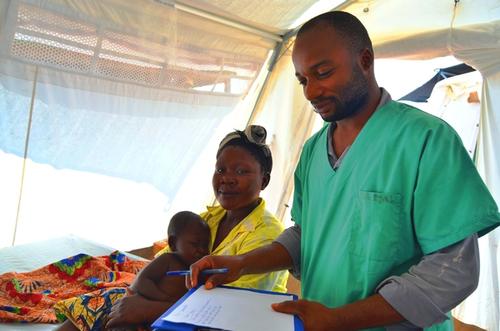The Médecins Sans Frontières (MSF) emergency team in South Kivu, Democratic Republic of Congo, was mobilised after receiving an alert on 2 December from the Provincial General Hospital of South Kivu in Bukavu. The previous day, 30 people had been admitted to the cholera treatment centre (CTC).
Cholera centre overwhelmed
An MSF team immediately went to the centre and found it to be completely overwhelmed. Ninety per cent of the cases had come from a district of the city called Camp Mweze. The community had already reported four more deaths possibly caused by cholera originating from a contaminated water source. The MSF intervention, that has now finished, treated 690 people.
156 under-5's receive treatment
The emergency intervention meant expanding the CTC capacity, strengthening the diagnosis and treatment of patients, ensuring the availability of all the material necessary for containing the disease and increasing awareness activities in the community to stop transmission. In the last six weeks, 690 people, including 156 under-5-year-olds, have received treatment.
Isolating the patient
Cholera causes vomiting, diarrhoea and severe dehydration. If not treated in time, the mortality rate is very high. However, the treatment is very effective and relatively simple: it consists of rehydrating the patient, and depending on the severity of the case, the hospitalisation time can vary from six hours to four days. A key issue in cholera interventions is isolating the patient well in order to prevent the disease from spreading.
Poor quality water
“South Kivu is a cholera endemic area. But in Bukavu, a city of one million inhabitants on the banks of Lake Kivu, there are also many factors favouring the spread of the disease: a large part of the population doesn’t have access to good quality water due to the poor infrastructure; the rainy season, which is when the disease spreads, lasts for nine months; and the hygiene habits of the population are not adequate,” explains Juan Matías, coordinator of MSF’s emergency teams in DRC. “That’s why it’s very important to work with the community to contain and prevent new outbreaks of cholera.” The last cholera epidemic in Bukavu was in 2011 and an MSF team responded with a rapid intervention on that occasion.
The intervention finished 27 January, after three weeks of cholera cases remaining within normal endemic levels. During the six weeks of the intervention, the MSF team worked in collaboration with staff from the Congolese Ministry of Health.
This is the sixth intervention carried out by the MSF emergency team in South Kivu, RUSK, (Réponse d’Urgence Sud Kivu) in 2013, after tackling two other cholera epidemics – in Kamanyola and Uvira – a malaria emergency in Lulingo, and two measles emergencies, one in Kitutu and another in Bunyakiri, which included a vaccination campaign of 65,000 children.



